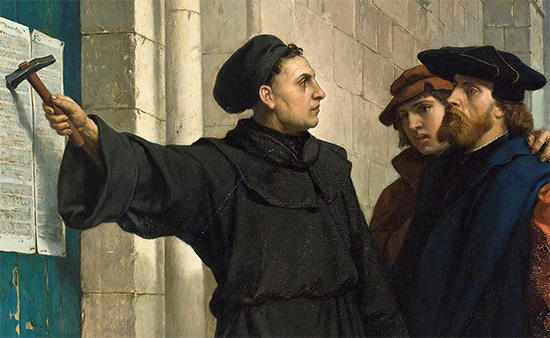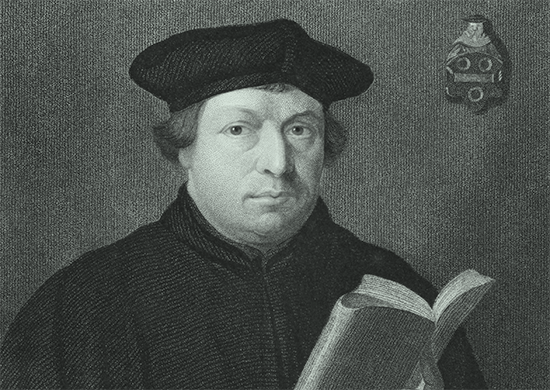
October-
November 2017
The Work Goes On
------------------
|






Lessons From Luther
By Paul Harrison
October 31 marks the 500th anniversary of the Protestant Reformation. That movement was launched when Martin Luther, a monk and priest in the Roman Catholic Church, nailed 95 statements for debate on the chapel door at Wittenberg. Those theses and the 121 volumes Luther penned over the years challenged the corruptions of his church and summoned it back to biblical Christianity. We can learn important lessons from Luther’s life and thought.
First, Luther reminds us God can greatly use Christians with a high level of learning. After studies at the University of Erfurt, he went on to earn a doctorate in theology at Wittenberg and, more importantly, he was a life-long student of truth. He gave himself to learning languages, especially those of Scripture. Skilled in his native German, he also worked easily in Greek, Hebrew, and Latin. He stated of the biblical languages: “Now if God did not despise them but chose them above all others for His Word, then we too ought to honor them above all others . . . The languages are the sheath in which this sword of the Spirit is contained.”
Not only a linguist, Luther was also a theologian, philosopher, translator, and historian. He labored over Plato, Aristotle, and the other great philosophers and could debate using medieval methods of argumentation with the best of scholars. He was conversant with the Church Fathers, often quoting Augustine (his favorite), Ambrose, Jerome, and Chrysostom, and he held these men in high esteem.
In light of this, we should remember that Paul did not say “not any” but “not many wise men after the flesh” are called (1 Corinthians 1:26). The Apostle himself was so highly trained a Roman ruler charged that “much learning” had made him insane (Acts 26:24). Moses was “learned in all the wisdom of the Egyptians” (Acts 7:22). God is pro-knowledge.
We Free Will Baptists have sometimes forgotten this, looking askance at those with book learning. While Jesus’ disciples were unlearned, and many who have followed in their footsteps no doubt have been greatly used, others who have braved the tempests of academia have also been greatly blessed by God. When we consider anointing by the Spirit at odds with education, we do a disservice to those who seek both, and insult the God of truth. Luther reminds us learning need not be a liability but can be a mighty tool in the hand of God.
Second, Luther reminds us Christian tradition should be evaluated by and subordinated to the Word of God. Over time, beliefs become enshrined to the point where those who call them into question are vilified. The Roman Catholic Church, with its emphasis on tradition, was especially hostile toward anyone who questioned its authority. Luther faced this firsthand. While holding the church’s historic positions in high regard, he correctly maintained that Scripture must take preeminence over tradition:
“No one will believe how great an ordeal it is and how severe a shock when a person first realizes that he must believe and teach contrary to the fathers,” Luther later mused, “especially when he sees that so many excellent, intelligent, and learned men, yes, the best of them taught thus, and that the majority of the people in the world shared their views . . . But in spite of all this, that one man, my dear Lord and Savior Jesus Christ, must have greater weight with me than all the holiest people on earth put together. Yea, He must also outweigh all the angels in heaven (Gal. 1:8) if they teach anything at variance with the Gospel, or if they add to or detract from the doctrine of the divine Word . . . It is truly difficult to subdue one’s own heart in these matters, to deviate from people who are so highly respected and who bear such a holy name—indeed, from the church herself—and no longer to have any confidence and faith in the church’s teaching. . . . This truly bewilders and dismays a person. But after all is said and done, I must say that I dare not accept whatever any man might say; for he may be a pious and God-fearing man and yet be mistaken and err. . . . Therefore we should place no reliance in any of the fathers or in their writings, but we should crawl under the wings of our Brood Hen, the Lord Jesus, and depend solely on Him.”
Luther’s stance is captured by the Latin phrase sola scriptura, Scripture alone, and we Free Will Baptists thankfully have embraced this position. Our denominational Treatise begins its theological statements with a full-throated endorsement of Scripture, calling the Bible “a sufficient and infallible rule and guide to salvation and all Christian worship and service.” It names Scripture as “our absolute authority.”
With that said, we face the subtle and very real danger of placing our tradition above and beyond the reach of Scripture. Those who make this mistake do so through the two-step process of believing their theological tradition to be a correct interpretation of Scripture and therefore equating the two, putting their statements of faith or their denomination’s on par with “thus saith the Lord.” With such thinking, to preserve one’s tradition is to preserve God’s truth. However, we should be more humble, remembering that in our fallen world “we know in part” (1 Corinthians 13:12) and not fully. Augustine’s concept of “learned ignorance” comes to mind. Our aim, therefore, should be first and foremost to promote the Word of God, and out of loyalty to God and His Word, we should maintain openness to disagreeing with our stated confessions of faith. Luther both taught this and sometimes undermined it by overconfidence in his conclusions.

This openness may frighten some, but the alternative is to refuse God and Scripture the right to sit in judgment over what we think and do. To reject this openness also grants others the right to be closed to scriptural argument, so Presbyterians must always remain Presbyterians and Catholics always Catholics. Is it not a wonderful fact that in 1654 Henry Dunster, the first president of Harvard College, reconsidered his position regarding infant baptism and, knowing it would cost him his job and more, became a Baptist? Is it not a joy to read of missionary Adoniram Judson’s commitment to Scripture, which led him to question his Congregational roots and become a Baptist? We could point to a host of others, including our own Benjamin Randall, whose loyalty to God’s Word led him to challenge his church’s tradition and to preach Free Will Baptist theology.
James Arminius noted the danger of tradition in his day and suggested an interesting precaution: “Is it not useful, for the purpose of bearing testimony to the power and the liberty of the church, occasionally to make some change in the laws ecclesiastical, lest the observance of them becoming perpetual, and without any change, should produce an opinion of the (absolute) necessity of their being observed?”
Third, Luther instructs us that because of God’s greatness, Christians should conduct themselves courageously. Repeatedly, the Reformer faced circumstances where obedience to God, as he understood it, placed his life in jeopardy. His attacks on the church’s sale of indulgences, which tied forgiveness to financial contributions, riled the pope and prompted him to have Luther disciplined. The plan was to get the German to an open meeting in Worms and force the label heretic on him. There was serious question, however, whether Luther would attend, for everyone knew what had happened in 1415: they promised the reform-minded John Huss safe conduct but then found a way to imprison him and later burn him at the stake.
Luther could have refused to meet, but instead he exposed himself to grave danger and went to debate the points he had raised against the church. On April 7, 1521, ten days before the meeting, he preached: “I will tell the truth, I must tell the truth, even though it cost me my neck 20 times over.” So he preached to a friendly audience, but did he hold fast when his life hung in the balance? Indeed, he did!
When asked at the meeting whether he would recant his positions, he famously said: “Unless I am convinced by the testimony of the Scriptures or by clear reason (for I do not trust either in the pope or in councils alone, since it is well known that they have often erred and contradicted themselves), I am bound by the Scriptures I have quoted, and my conscience is captive to the Word of God. I cannot and will not recant anything, since it is neither safe nor right to go against conscience. May God help me. Amen.”
Shortly after taking this stand, Luther left Worms and was taken by friends to a hideout, the Castle Wartburg, for fear he would be seized by the Catholics and meet the fate of Huss.
Six years later, the bubonic plague swept through Germany, and Luther was asked whether ministers should stay in infected cities or flee to safer locales. His answer was an open letter entitled Whether One May Flee From a Deadly Plague. He wrote: “Those who are engaged in a spiritual ministry such as preachers and pastors must likewise remain steadfast before the peril of death. We have a plain command from Christ, A good shepherd lays down his life for the sheep but the hireling sees the wolf coming and flees (John 10:11). For when people are dying, they most need a spiritual ministry.”
These were not empty words. On August 2, 1527, the plague struck Wittenberg, where Luther lived and ministered. With mortality rates ranging from 30 to 90%, sufferers experienced fever, delirium, huge boils, and loss of consciousness. Death often followed infection within three or four days. Elector John ordered Luther and his colleagues to leave for Jena. However, the Reformer stayed and ministered to the suffering. By August 19, 1,800 people had died. Luther’s own house was turned into a hospital of sorts, while his wife Katie was pregnant. His son Hans refused to eat for three days. Luther wrote: “There are battles without and terrors within.” Yet he stayed. In 1546, at age 62, Luther died in his bed, but he had lived a life full of courage and trust in God and had been willing to die for his Lord.
Finally, Luther teaches us that God can and does use deeply flawed instruments. For all his greatness, the man who almost single-handedly turned the religious world on its head had serious shortcomings. Bombastic and intolerant, he sliced and diced about everyone who disagreed with him, often employing scatological terminology too crass to include here. Examples of his sharp words are not hard to find. He labeled his Roman Catholic adversaries “sophistic worms, grasshoppers, locusts, frogs, and lice.” One opponent he called “a toad eater and a fawner.” Even those who basically sided with him sometimes felt his verbal lashings. Though agreeing with Zurich’s Huldrych Zwingli on so much, he allowed their disagreement regarding the Lord’s Supper to poison their relationship. He later mocked the minister and exulted in his death, sardonically writing: “Blessed is the man who hath not walked in the counsel of the Sacramentarians; nor stood in the way of the Zwinglians; nor sat in the seat of the Zurichers.”
French Reformer John Calvin never met Luther but recognized the debt he owed the German, referring to him as “endued with rare and excellent virtues,” “a most distinguished servant of Christ, to whom we are all of us largely indebted,” and “the very excellent pastor of the Christian Church.” But Calvin also wrote of “Luther’s unkindness,” his “fierce invective…his restless, uneasy temperament which is so apt to boil over in every direction.” The one letter Calvin penned to Luther was never delivered for fear of the German’s negative reaction, though the letter was congenial, opening with the words “my much respected father.”
It is sad to reflect on these harsh words of the Reformer, but there is more that must be said. His 1543 book On the Jews and Their Lies presents the darkest picture yet of the man. Earlier he had reached out to the Jews, but in this piece he vented his wrath without restraint, calling them “lazy rogues,” a “devilish burden,” and “our plague, our pestilence, and our misfortune.” His recommendations for dealing with the Jews were even worse: “Set fire to their synagogues or schools,” “their houses also [should] be razed and destroyed,” “eject them forever from the country,” and “they [should] be forbidden on pain of death to praise God, to give thanks, to pray, and to teach publicly among us and in our country.”
Ah, Luther, how could you write such things?
But we might look in the mirror as we chide Luther for his lack of love. Confronted with the devil, the world, and our flesh, we sometimes turn on our own and act as though our brothers and sisters are the enemy. Surely, we must have our disagreements, but just as surely, we need not emulate Luther in how we handle them.
Five centuries ago the world desperately needed someone to call out the Church, and a young man, full of strength but also weakness, stepped forward. He still teaches us lessons and will perhaps inspire others to follow in his steps, for while the Church has thankfully been reformed, it must always be reforming.
About the Writer: Paul V. Harrison pastors Madison Free Will Baptist Church in Madison, Alabama.
Photos: (Top) Ferdinand Pauwels, Wikimedia Commons; (Bottom) Getty Images.
|
|

